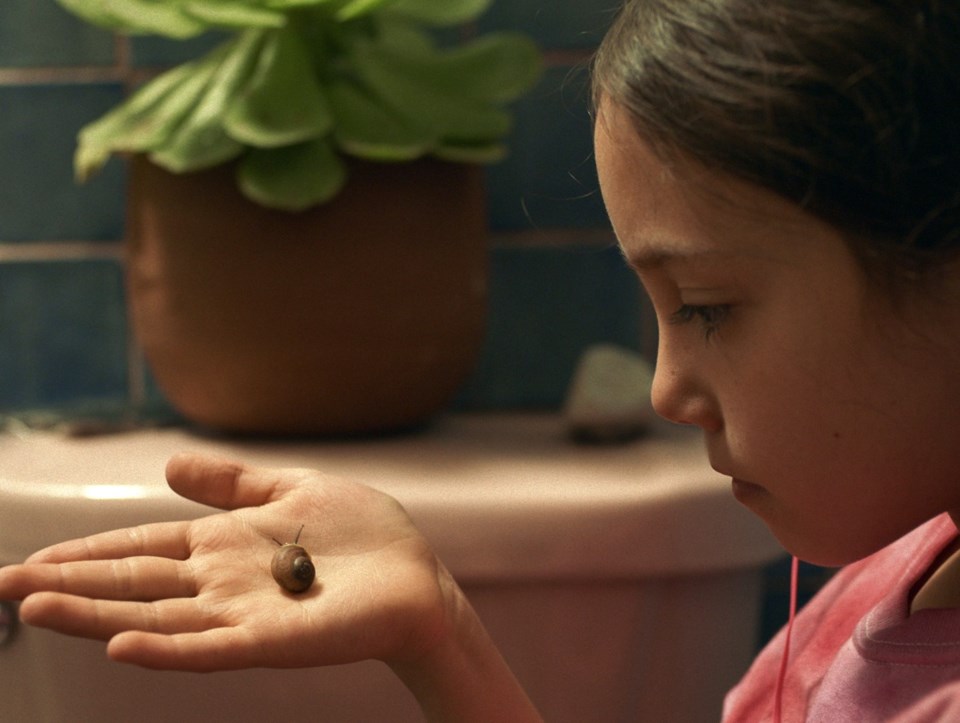For a film about death, Lila Avilésâ is extraordinarily lived in.
Avilésâ camera roams through the festive, cluttered gathering of an extended family as they prepare for a birthday celebration that evening. Watching it all is the 7-year-old Sol (NaÃma SentÃes), whose father, Tonatiuh or âTonaâ (Mateo Garcia), is to be feted.
The scenes are familiar, unfolding with a natural, warm disorder. Tonaâs sisters are there. Alejandra (Marisol Gasé) is working in the kitchen and dyeing her hair. Nuri (Montserrat Marañón) is making a cake while her own daughter, Ester (Saori Gurza), lurks about. Thereâs bickering and laughter.
But humdrum as all of this is, colossal and devastating happenings are at work in âTótem.â When we sporadically spy Tona, who stays in his bedroom for much of the film, heâs weak and strikingly gaunt, debilitated by cancer. In the filmâs opening moments, Sol is riding in her motherâs (Iazua Larios) car. While passing beneath a bridge, they hold their breath and make a wish.
âShould I tell you what it was?â Sol says after emerging from the darkness. âI wished for Daddy not to die.â
With that, the filmâs title credit appears, allowing you a quick moment to pick your heart off the floor and steel yourself for whatever is to come.
That name, Sol, is a hint. Planets are in motion. Young Sol spends much of âTó³Ù±ð³¾â spying on another world, the adult world, a place buzzing with activity that seems strangely, perhaps, distracted from the crushing calamity right down the hall.
Everyone around Sol seems intent on shielding her from it. Her familyâs interactions arenât in any way cruel, but theyâre trying to put a happy face on it. For the party, Sol is dressed in a clown wig and nose. She wants to see her dad, but sheâs told repeatedly that she canât. Heâs resting.
Are they protecting her or distracting her? Either way, in this impeccably observed, achingly soulful film, Sol sees through it. Sheâs too perceptive. Though âTó³Ù±ð³¾â sometimes drifts to other perspectives, it stays closest to Sol. The movie resides in her watchful eyes, and the dawning dread welling up behind them. A world, for Sol, is being eclipsed.
âTótem,â which was and begins its theatrical release Friday, more than confirms the talent flashed by Avilés in her 2018 debut âThe Chambermaid.â The year is young, but youâre unlikely to see a film as richly textured as Avilésâ masterful childâs-eye view of death and family.
Part of the filmâs power is in how organically the movie unfolds, free of sentimentality or overemphasis. Cinematographer Diego Tenorio shifts room to room and character to character, as if visiting interplanetary bodies in constant orbit around each other. Sometimes, they can feel genuinely alien. The grave-faced grandfather Roberto (Alberto Amador), who tends to bonsai trees, speaks through a device that renders his halting speech robotic.
But this is, most assuredly, Earth weâre on. In the home where the family has gathered, Avilés occasionally turns her focus toward not just each character but some of the insect life that makes its way through the house. Tona may die, but life wonât stop moving. In the face of that cold truth, wishes and spirituality have scant usefulness. A psychic is brought in to cleanse the space, with comical results.
And itâs that profoundly melancholy perspective on the constant churn of life that so distinguishes âTótem.â Sol is resistant. When the party starts and friends and family have gathered in the garden outside, she solitarily sits on the roof, contemptuously looking down at them.
Later, when they move inside for a kind of talent show to cheer Tona, Sol dresses up, sitting on her mother's shoulders while a cape hides her mom. Sol, lip-syncing opera, stands tall and performs like an adult beyond her years. Before they begin, her mother opens and closes the cape like a magic act.
âNow thereâs two of us," she says. "Now just one.â
"Tótem,â a Sideshow and Janus Films release, is unrated by the Motion Picture Association. In Spanish with English subtitles. Running time: 95 minutes. Four stars out of four.
___
Follow AP Film Writer Jake Coyle at:
Jake Coyle, The Associated Press



